8.0 WIMMA Lab Structure and Phases
People selected for WIMMA Lab are divided into smaller teams, i.e. virtual companies. Every virtual company gets their own assignment, some even multiple ones. The size of the virtual company depends entirely on the requirements of the assignment.
Progress is tracked by each team's own Kanban board, which they keep up to date. The Kanban board has its own areas for various tasks:
- Backlog
- To Do (unfinished)
- Doing
- Waiting For Review
According to Kanban, each team also assigns themselves a WIP (or Work In Progress) number. The figure tells you how many tasks can be done at the same time. You cannot exceed this number. If there are too many tasks to be done, something must be moved from the Doing area back to the To Do area. Tasks can be added to the To Do list as soon as previous tasks are completed and the WIP number isn't full.
The most important tasks can be labeled, for example, with a label, so you know they require immediate attention and must be done first before other tasks.
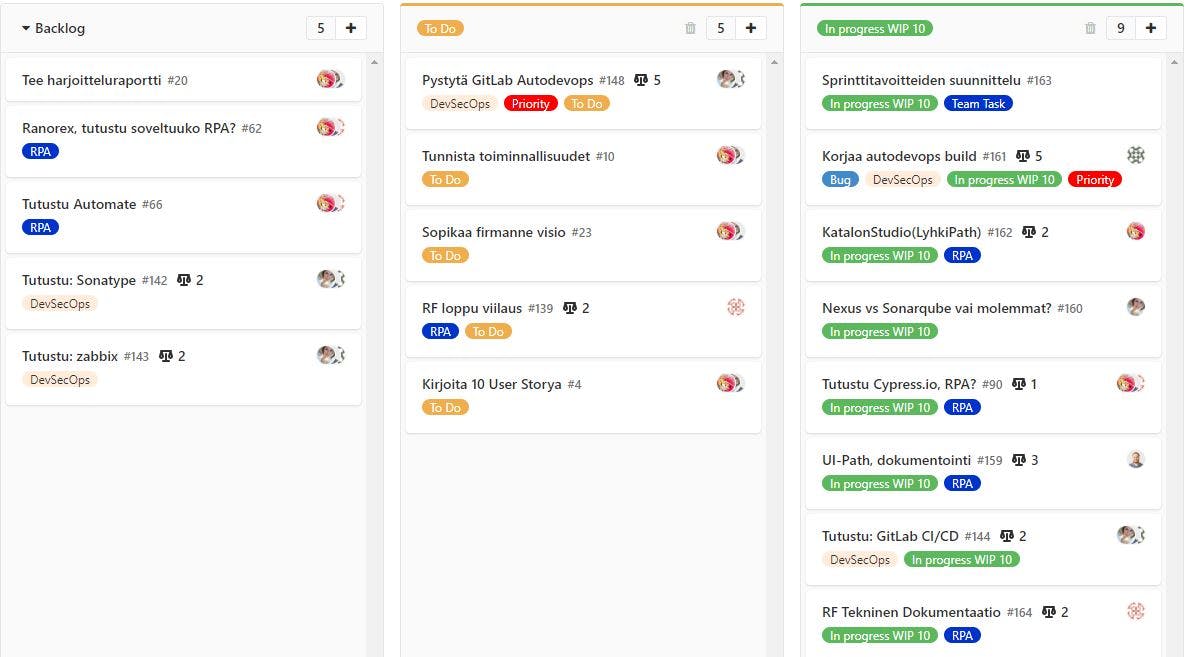
Mysticons' Kanban board in GitLab.
The weight and the completion time (Estimate) are also assessed. The load value indicates how demanding the task is. For example, a work at load value 1 can be estimated to last less than an hour, while a load value of 5 may take several days.
WIMMA Lab is a very short project where you need to get started very quickly. Two and a half month period is divided into shorter lengths or sprints. At the start of each sprint, the teams define their goals and at the end of the sprint, the team achievements are reviewed together.
Generally, at least the team leader, coach and, if possible, the client of the assignment will participate in the review. The review will look at the results of the team's work and see if it is what it was supposed to be. If the goals are not achieved, the reasons for this can be jointly assessed and the work adapted to respond as desired as soon as possible. After corrections to the work, a new review is held at the agreed time.
In WIMMA Lab in the summer of 2018, two-week sprints were in use, so the reviews were every other Friday. On Monday after the review, the teams defined the goals of the new sprint and documented them.
8.1 Getting Started
Before the start of WIMMA Lab, you should make a clear schedule for the first sprint, as the participating students may not yet know what is going to happen during WIMMA Lab. the schedule should also be informed to the participants, so they can get familiar with it in peace.
It is a good idea to set up a common discussion channel, for example, Slack, where WIMMA Lab participants, coaches and support staff are involved. By doing this, one can easily reach everybody if there are any important announcements. For each virtual company, it is also worthwhile to make their own channel where they can discuss matters related to the assignment.
In the summer of 2018, the coach had already created a project in the GitLab environment, which had assigned shared tasks for all teams for the first few weeks. Each virtual company copies the project to itself as a basis for getting to know GitLab. In this way, each team can get up and running and students will learn how to use the Kanban board and share tasks in it.
The first sprint (Sprint 0) in WIMMA Lab was only three days in summer 2018. Its topic was "Get hold of it and team up!". The sprint's goal was to go through WIMMA Lab's overall operations, summer schedule, assignments, and the composition of virtual companies. During the sprint, workspaces were also built and computers were prepared for use.
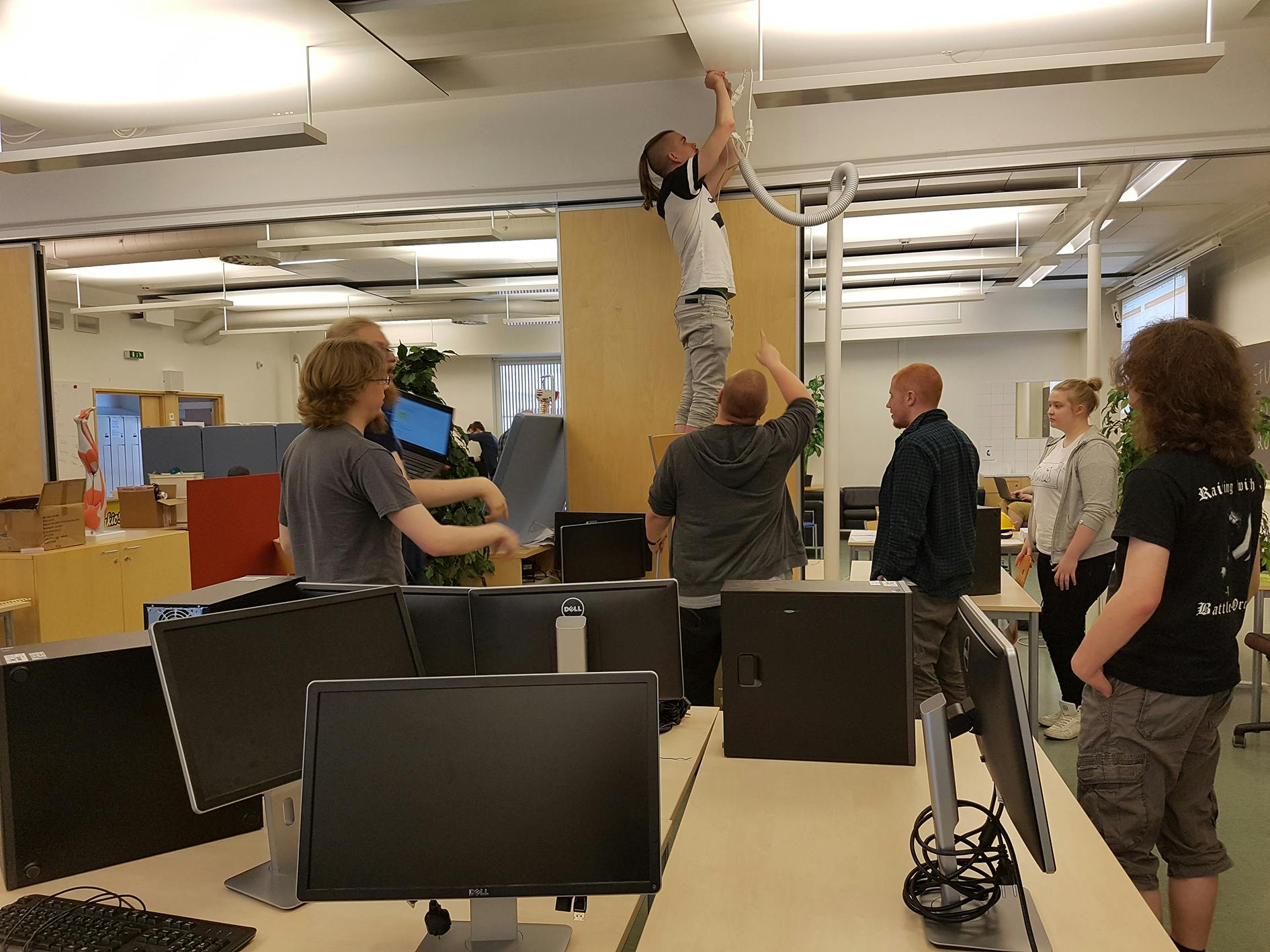
Workspace building in summer 2018.
8.1.1 WIMMA Lab General Regulations
In the orientation phase, everyone should get familiar with the rules of WIMMA Lab so that they are not ambiguous to anyone.
WIMMA Lab uses normal office hours, from Monday to Friday from 8am to 4pm. The lunch break is 45 minutes, which is deducted from the daily working time. Each team can keep their breaks when they want, as long as they are at the time of mandatory events. Everyone keeps their own hours up and reports them in the way defined by the organizers.
Sick absences and other absences should be reported as soon as possible to the coach and the team leader.
As soon as you start, you should also organise a coffee and cleaning cycle (read more in Chapter 6) so that the first group can start as soon as possible. In WIMMA Lab, the coffee was brewed at the teachers' premises and brought to the working area in thermos jugs, as they were not allowed to bring the coffee pots in for safety. It is advisable to find out in advance the safety practices of the premises in advance.
8.1.2 Division into Groups
Members of virtual companies should be shared in advance on the basis of the expertise required by the assignment and the competence and interest of the participants.
A team leader should also be chosen for each virtual company. You should still make sure they want to do the job after choosing them.
After reporting group configurations, teams can build their own working space. All team members should sit in the same group to make communication within the team as easy as possible.
If someone feels they are in a wrong virtual company and would like to switch to another one (for example, someone would be interested in a different assignment), it is advisable to report it as soon as possible. Exchanges can be made, assuming that the level of competence remains roughly the same.
8.1.3 Project Presentations
It would be a good idea to get the people and contact persons involved in the assignments to visit the WIMMA Lab participants right from the start. It is very important to get students familiar with the clients and hear the order directly from the client, so you do not feel like an "unnecessary school task that never goes anywhere". Developing a solution to a real problem or a need creates motivation.
At the same time, the entrusted team will be given the opportunity to ask more specific questions and take their contact information to set up a meeting in the future. The questions may not be raised at such an early stage when everything is very new and there is a lot of information.
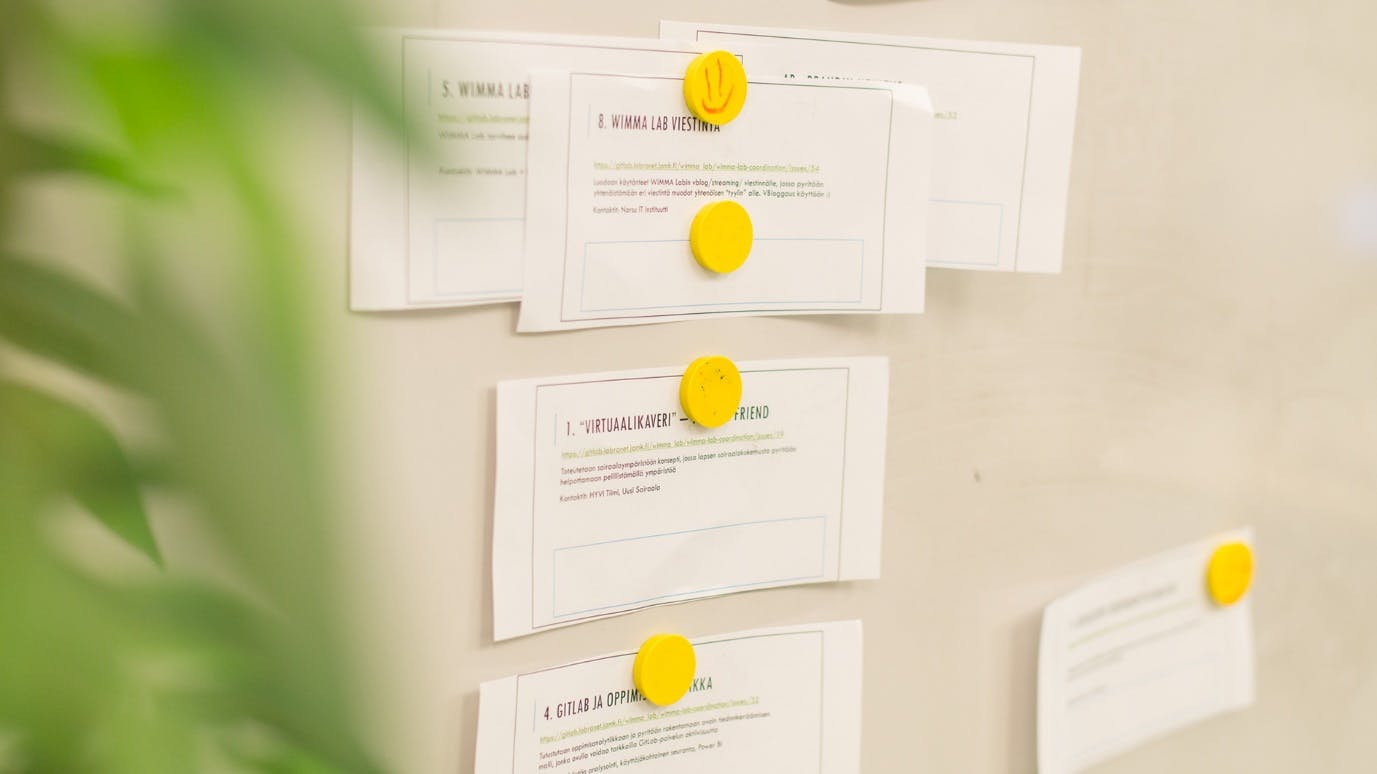
Assignments with a common board.
8.2 Mid-term
After the orientation phase, the work itself begins! This took place at WIMMA Lab in the summer of 2018 for Sprint 1-5. The steps were divided as follows:
- The topic of Sprint 1 was “Learn and Learn” and focused mainly on grouping and concept building. Teams formed a common image of the product and started creating documentation according to the requirement definition.
- Sprint 2: The topic was "Now we're already reviewing the review" and during that time we had to get something ready for the Open Doors that were at the end of the sprint. Open Doors presented the assignments to the public and feedback was collected. After the Open Doors, it was Kettu Keter's turn... (Read more about the event in chapter 12.)
- The topic of Sprint 3 was “You can actually concentrate!” and Sprint 4's *“Integrate! Get things done together." These sprints were used to process assignments on the basis of feedback from Open Doors.
- Sprint 5 was "JES!" The End Is In The Horizon ”. This Sprint no longer brought in new features, but stabilized and tested the products. The documents and instructions for use were finalized in the handover.
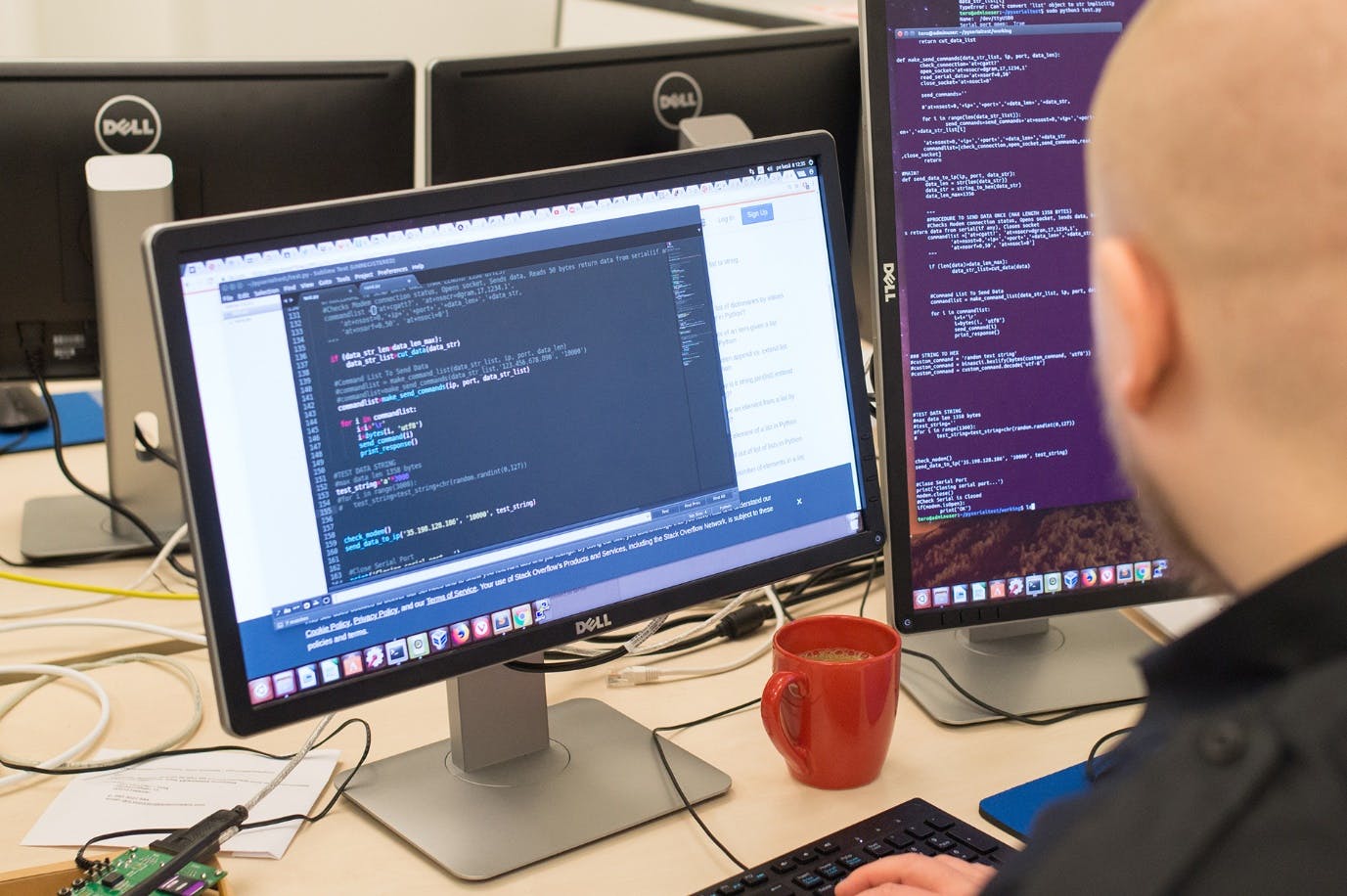
Work in the Overflow team.
8.3 Wrap-up
In the WIMMA Lab in the summer of 2018, Sprint 6 lasted for just two days and was dedicated for documentation. Its topic was “Now you getto relax! Let's Clean And Document”.
The main objective was to deliver the project and the documentation in the form in which they were requested by the sponsor.
Each student wrote his own learning diary to get their ECTS credits from JAMK University of Applied Sciences. This is just how JAMK works, so you don't need to make a learning diary for each course nor in the workplace.
Lastly, the premises were cleaned up, that is, in practice, the workstations were dismantled and all the goods were returned where they were originally gotten.
When everything has been restored to its original state and the facilities cleaned up, it is finally time for Kaunailta… (Read more about Kaunailta in chapter 12.)
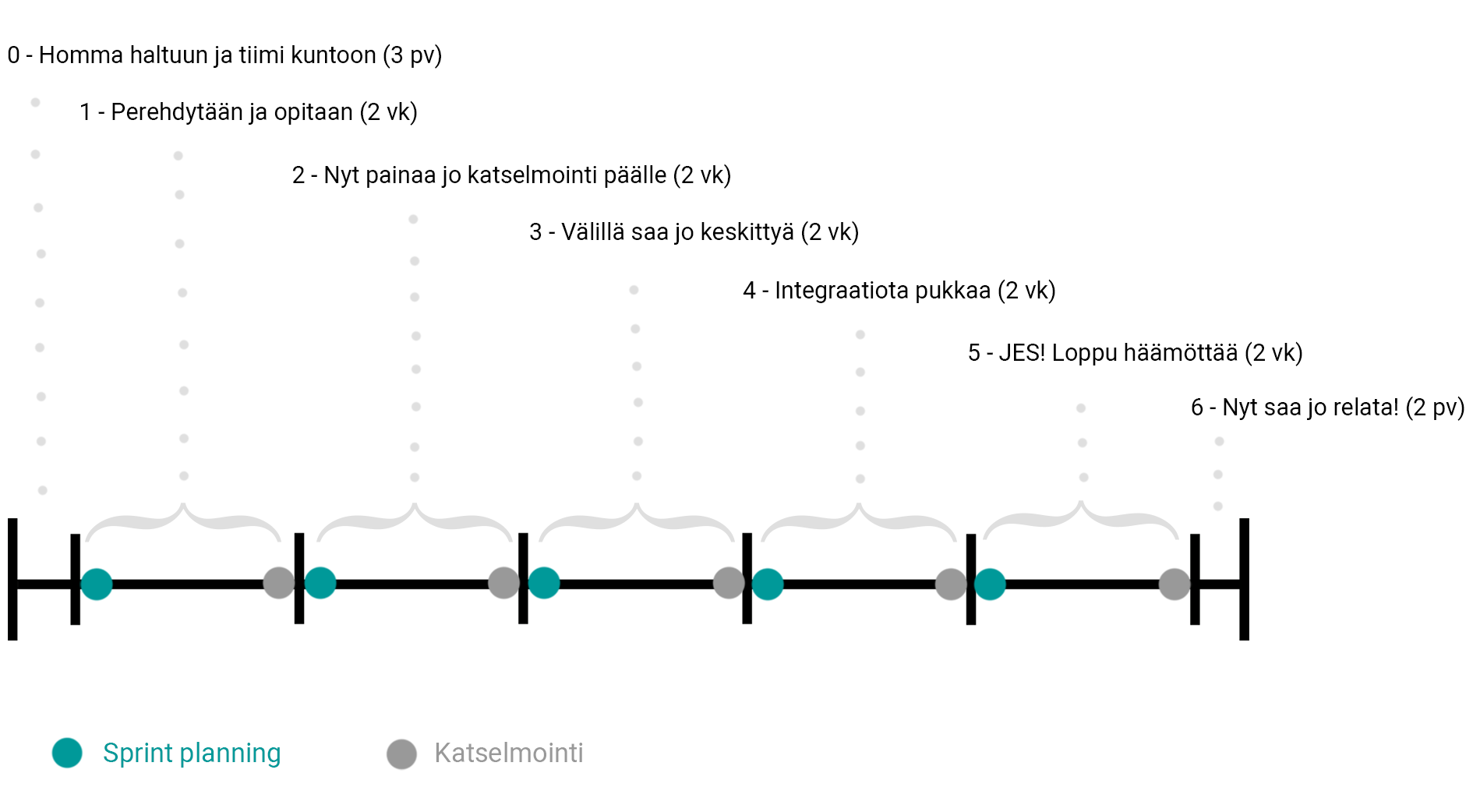
WIMMA Lab sprints in the summer of 2018.